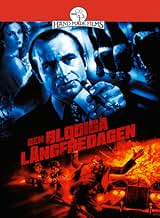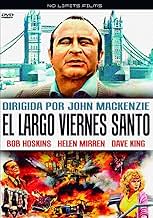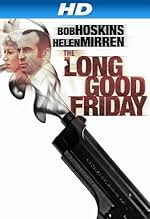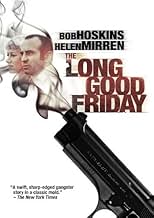Un gangster en devenir est mis à l'épreuve par l'irruption d'une menace inconnue et redoutable.Un gangster en devenir est mis à l'épreuve par l'irruption d'une menace inconnue et redoutable.Un gangster en devenir est mis à l'épreuve par l'irruption d'une menace inconnue et redoutable.
- Nomination aux 1 BAFTA Award
- 2 victoires et 2 nominations au total
Avis à la une
There are so many things to appreciate in this movie. First and foremost, Bob Hoskins and Helen Mirren give outstanding performances as the First Couple of London's underworld. He, with the Cockney-made-good aspirations for status and the "class" he can never attain, epitomizes the hands-on manager overtaken by larger events. She, the cool-headed savvy- tough-and-sexy moll, is almost on top of things enough to redeem the situation but not quite. The key elements of the underworld ruling coalition-- dirty councilor and policeman, lieutenants of varying backgrounds both tough and educated-- make you believe in how this man has achieved peace through strength.
The film's plot is Byzantine whodunit, with gangland-style violence as an accent piece that seems downright tame in the age of "Pulp Fiction". The real hidden star, though, is late-70's London-- oh so run-down and yet full of the potential that drives Harold's ambitions. The views from boating on the Thames are unrecognizable to those who have only seen modern London--- the sole landmarks in common are Tower Bridge and the Savoy hotel. The towers of the City and modern Docklands are just a twinkle in dreamers' eyes.
Overall TLGF is a modern tragedy in the true land-of-Shakespeare tradition, somewhere between Macbeth and Hamlet and King Lear: ambition, betrayal, and the sweep of history interact richly without being heavy-handed in symbolism or over-artiness. This is a satisfying and complex film that invites re-viewing and reflection.
The film's plot is Byzantine whodunit, with gangland-style violence as an accent piece that seems downright tame in the age of "Pulp Fiction". The real hidden star, though, is late-70's London-- oh so run-down and yet full of the potential that drives Harold's ambitions. The views from boating on the Thames are unrecognizable to those who have only seen modern London--- the sole landmarks in common are Tower Bridge and the Savoy hotel. The towers of the City and modern Docklands are just a twinkle in dreamers' eyes.
Overall TLGF is a modern tragedy in the true land-of-Shakespeare tradition, somewhere between Macbeth and Hamlet and King Lear: ambition, betrayal, and the sweep of history interact richly without being heavy-handed in symbolism or over-artiness. This is a satisfying and complex film that invites re-viewing and reflection.
"The Long Good Friday" was given a limited release in the U.S. but fortunately it opened in Los Angeles. Based on a very short synopsis in the L.A. Times, my wife made the 30-mile drive from Pasadena to Santa Monica and were rewarded with the best crime drama I've ever seen. This film is the perfect coming-together of writing, directing and acting to produce a cinematic gem. Nothing overblown and grandiose like "The Godfather" but a tight story that never bogs down, filled with real characters that stand out from the screen. We were introduced to Bob Hoskins and Helen Mirren and both of them have since provided us with some great performances on both large and small screens. I would definitely take this one to the proverbial desert island.
It's the early 1980s, it's Good Friday, and Harold Shand is waiting to entertain some powerful American muscle. He hopes to get them to help fund his dockside development, but someone is murdering his men, and although Harold has a good idea who is responsible, he isn't quite prepared for the events that follow.
Plot wise, The Long Good Friday is a lesson in under taxing the audience, simplicity in structure and forgoing thunder in the name of telling a solid story. The Long Good Friday is a British gangster picture that owes more to the Paul Muni and Edward G Robinson pictures from the golden age than something like "The Godfather". Where the characters are men of the street, working class villains who literally could be living around the corner from us, their respective antics giving them a reputation as infamous stars to be feared - and grudgingly admired.
What many modern day film lovers may not be aware of is that "The Long Good Friday" had its release delayed, held back a year as Margaret Thatcher and her merry men frothed at the mouth due to the film's portrayal of the Irish Rebublican Army. This was at a time when the Irish troubles were reaching new and terrifying heights, and here in this film, the government sensed a fall out that could have sent wrong message shock waves across the British Isles. This is one of the chief reasons that lifts the pic high above many of its contemporaries, it may be a simple story, but it's not merely about two gangs striving for power on one manor!.
Barrie Keeffe's script positively bristles with a hard bastard edge, some of the set pieces play out as true Brirtish greats, once viewed they are not to be forgotten. Some of the dialogue has an air of timeless bravado about it, delivered with cockney brashness from Bob Hoskins' Harold Shand. Hoskins is on fire, seemingly revelling in the role and fusing menace with a genuine sense of earthiness, one moment Harold is the bloke you want to have a pint of beer with, the next he's one step from rage induced retribution. Helen Mirren is fabulous as Harold's wife, Victoria, loyal and unerringly calm in the face of the madness unfolding, while the supporting cast are also highly effective, with a cameo from Pierce Brosnan that is icy cold in making a point.
Perhaps now it feels like it's only of its time, and it may well be that it's only British viewers of a certain age that can readily embrace the all encompassing thread of gangland London at risk from insurgents? But I will be damned should I ever choose to love this film less with each passing year, for to me it only just stops shy of being a British masterpiece, bristling with realism at a troubled time, and cheesing off Margaret Thatcher in the process, hell it works for me, always. 9/10
Plot wise, The Long Good Friday is a lesson in under taxing the audience, simplicity in structure and forgoing thunder in the name of telling a solid story. The Long Good Friday is a British gangster picture that owes more to the Paul Muni and Edward G Robinson pictures from the golden age than something like "The Godfather". Where the characters are men of the street, working class villains who literally could be living around the corner from us, their respective antics giving them a reputation as infamous stars to be feared - and grudgingly admired.
What many modern day film lovers may not be aware of is that "The Long Good Friday" had its release delayed, held back a year as Margaret Thatcher and her merry men frothed at the mouth due to the film's portrayal of the Irish Rebublican Army. This was at a time when the Irish troubles were reaching new and terrifying heights, and here in this film, the government sensed a fall out that could have sent wrong message shock waves across the British Isles. This is one of the chief reasons that lifts the pic high above many of its contemporaries, it may be a simple story, but it's not merely about two gangs striving for power on one manor!.
Barrie Keeffe's script positively bristles with a hard bastard edge, some of the set pieces play out as true Brirtish greats, once viewed they are not to be forgotten. Some of the dialogue has an air of timeless bravado about it, delivered with cockney brashness from Bob Hoskins' Harold Shand. Hoskins is on fire, seemingly revelling in the role and fusing menace with a genuine sense of earthiness, one moment Harold is the bloke you want to have a pint of beer with, the next he's one step from rage induced retribution. Helen Mirren is fabulous as Harold's wife, Victoria, loyal and unerringly calm in the face of the madness unfolding, while the supporting cast are also highly effective, with a cameo from Pierce Brosnan that is icy cold in making a point.
Perhaps now it feels like it's only of its time, and it may well be that it's only British viewers of a certain age that can readily embrace the all encompassing thread of gangland London at risk from insurgents? But I will be damned should I ever choose to love this film less with each passing year, for to me it only just stops shy of being a British masterpiece, bristling with realism at a troubled time, and cheesing off Margaret Thatcher in the process, hell it works for me, always. 9/10
Harold Shand (Bob Hoskins) is a successful London gangster aspiring to be a legitimate owner of the abandoned Docklands for a casino and other developments with American mafia money. Victoria (Helen Mirren) is his smarter better half. While he sips champagne with corrupt cops and American mobster Charlie, IRA hit-man (Pierce Brosnan) is killing his right hand man. His other guy Eric is blown up in a car bomb outside of church on Good Friday. Harold tries to uncover the cause and finds that a minor deal unknown to him connected to IRA had gone terribly wrong. The IRA holds Harold personally responsible.
This is a great staring performance from Bob Hoskins. He infuses this movie with great energy. Without him, the movie does struggle a little. The plot doesn't have much tension. It also has a great young Pierce Brosnan prominently as a nameless IRA hit-man.
This is a great staring performance from Bob Hoskins. He infuses this movie with great energy. Without him, the movie does struggle a little. The plot doesn't have much tension. It also has a great young Pierce Brosnan prominently as a nameless IRA hit-man.
Very much in the tradition of the American gangster films of the 30s and 40s, this movie centres around a bravura performance by the central gangster (Edward G Robinson/James Cagney then; Bob Hoskins now). Bob Hoskins raves and fights against a world that is rapidly moving beyond his control and, although he is an unpleasant, violent and vicious character, you end up caring for him.
Interesting also as a historical snapshot of a period in London's history (the redevelopment of the Docklands) now gone.
Interesting also as a historical snapshot of a period in London's history (the redevelopment of the Docklands) now gone.
Le saviez-vous
- AnecdotesBob Hoskins' voice was dubbed over by another actor from Wolverhampton out of fear that Americans wouldn't understand his London accent. After Hoskins threatened to sue Jack Gill and British Lion, the dubbing was removed. He was supported by Richard Burton, Sir Alec Guinness, and Warren Beatty.
- GaffesThe last shot of the swimming pool being drained is actually water coming in, but shown in reverse.
- Citations
Pool Attendant: They kept it all incognito. They're gonna collect the body in an ice cream van.
Harold: There's a lot of dignity in that, isn't there? Going out like a raspberry ripple.
- Versions alternativesSome dialogue has been altered on the DVD version presumably for the US audience. "National Service" becomes "Army Service" and in the scene where Harold says they had to carry a wireless about has been changed to carry a bazooka about.
- ConnexionsFeatured in Dangereuse Humiliation (1982)
Meilleurs choix
Connectez-vous pour évaluer et suivre la liste de favoris afin de recevoir des recommandations personnalisées
- How long is The Long Good Friday?Alimenté par Alexa
Détails
- Date de sortie
- Pays d’origine
- Site officiel
- Langues
- Aussi connu sous le nom de
- Du sang sur la Tamise
- Lieux de tournage
- Sociétés de production
- Voir plus de crédits d'entreprise sur IMDbPro
Contribuer à cette page
Suggérer une modification ou ajouter du contenu manquant






































